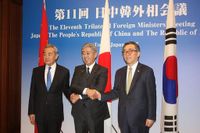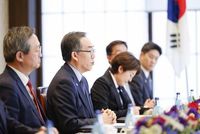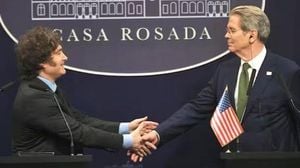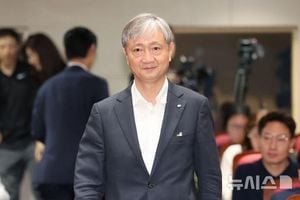In a significant gathering on March 22, 2025, foreign ministers from South Korea, Japan, and China met in Tokyo to reaffirm their commitment to peace and stability on the Korean Peninsula amidst a backdrop of evolving global dynamics. This trilateral meeting, marked by a spirit of cooperation, was a continuation of efforts revitalized by previous summits aimed at enhancing regional security and economic collaboration.
South Korean Foreign Minister Cho Tae-yul emphasized the shared responsibility of the three nations in maintaining peace in the region. "We reaffirmed that maintaining peace and stability on the Korean Peninsula is a shared interest and responsibility of the three countries," Cho stated at a joint press conference following the talks. He highlighted the importance of the discussions being timely and meaningful as they come in the wake of increased tensions, particularly concerning North Korea's recent military actions.
The meeting held special significance as it was the first such trilateral dialogue involving ministers from Japan and China since April 2019, signaling a thaw in relationships strained by historical grievances and regional security concerns. Furthermore, the talks came at a time when the political landscape was influenced greatly by the U.S. trade policies under President Donald Trump, which had led many international trade partners to reassess their positions.
Wang Yi, the Chinese Foreign Minister, spoke on the need for enhanced cooperation between the three nations. "We agreed to push forward with regional economic integration, including the resumption of free trade agreement negotiations," he noted. This sentiment was echoed by Japanese Foreign Minister Takeshi Iwaya, who asserted the necessity for their countries to foster future-oriented exchanges. He explained, "It is extremely important for the three countries ... to promote future-oriented exchanges and cooperation and guide the region and international community from division to cooperation."
However, alongside the discussions of cooperation and economic ties, the ministers addressed the urgent need for a united front against North Korea's provocations. Cho warned against rewarding North Korea for its actions, particularly in light of the North's military support for Russia in the ongoing conflict in Ukraine. "It's important for South Korea, Japan, and China to faithfully carry out U.N. Security Council (UNSC) sanctions against North Korea and make efforts to stop the North's provocations and bring about its complete denuclearization," he stressed.
Iwaya further raised concerns surrounding North Korea's increasing military activities and their deepening ties with Moscow, underscoring the shared goal of denuclearization among the three nations. He conveyed Japan's willingness to actively communicate and implement UNSC resolution sanctions effectively. This focus on North Korea not only addresses immediate security threats but also reflects the political complexities of the Korean Peninsula, which is fraught with historical and ongoing tensions.
The discussions also touched upon the significant historical grievances that must be addressed for smoother relations, particularly regarding Japan's past actions during World War II, which had left a lasting impact on South Korean sentiments. In a context where diplomatic relations have often been hindered by these issues, the foreign ministers agreed on the necessity of continued communication to advance bilateral relations without interruption.
Facing these multifaceted challenges, Wang Yi emphasized the need for all parties to address the root causes of security issues on the Korean Peninsula. He stated that all parties should "meet each other halfway, show goodwill to each other, strive to form positive interactions and seek the greatest common ground for their respective concerns." The willingness to engage constructively underlines a new chapter in diplomatic interactions in the region.
The trilateral relationship remains particularly critical as these nations navigate a complex web of geopolitical dynamics influenced by both regional historical contexts and global economic pressures. The foreign ministers' commitment during these talks will likely pave the way for future summits aimed at solidifying cooperation frameworks and addressing mutual security concerns in a rapidly changing geopolitical environment.
As the discussions wrap up, it is clear that achieving lasting peace and stability on the Korean Peninsula requires not only addressing the immediate threats posed by North Korea but also confronting the historical complexities and economic challenges that underpin the relationships between South Korea, Japan, and China. With an eye on the future, the trio of nations appears more committed than ever to find common ground and work collaboratively towards ensuring a stable and prosperous region.





